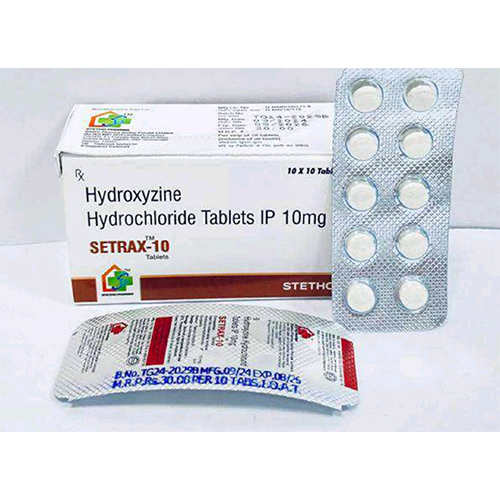Call us now
07971459530
Hydroxyzine Hydrochloride is a first-generation antihistamine with anxiolytic, sedative, anti-allergic, and antiemetic properties. It acts as an H1 receptor antagonist and is commonly used for allergies, anxiety, and sleep disturbances.
| Ingredient | Strength | Function |
|---|---|---|
| Hydroxyzine Hydrochloride | 10 mg | Antihistamine; used for allergy, anxiety, itching |
Allergic conditions:
Urticaria (hives)
Pruritus (itching)
Allergic rhinitis
Contact dermatitis
Anxiety and tension relief
Sedation premedication (pre-op and post-op)
Sleep disturbances (short-term)
Nausea and vomiting (especially of psychogenic origin)
| Indication | Typical Adult Dose |
|---|---|
| Allergies / itching | 1025 mg 24 times daily |
| Anxiety | 50100 mg/day in divided doses |
| Sleep aid (short-term) | 2550 mg at bedtime |
Pediatric and geriatric doses should be adjusted.
Should be taken with or without food, preferably in the evening for sedation purposes.
Avoid alcohol and CNS depressants (increased sedation risk)
Use with caution in:
Elderly (risk of confusion, drowsiness, falls)
Patients with glaucoma, prostatic hypertrophy, or urinary retention
Hepatic or renal impairment
Not recommended during early pregnancy and lactation
| Common | Less Common / Serious |
|---|---|
| Drowsiness, dizziness | Confusion (especially in elderly) |
| Dry mouth, blurred vision | QT prolongation (rare, high doses) |
| Headache, GI upset | Tremor, coordination problems (rare) |
Can impair mental alertness; avoid driving or operating machinery
Increased CNS depression with:
Alcohol
Benzodiazepines
Opioids
Sedatives
May interfere with allergy skin tests (stop at least 72 hours prior)
Store below 25C, in a dry place
Protect from light and moisture
Keep out of reach of children


Price:
Price 200.0 INR / Box
Minimum Order Quantity : 10 Boxes
Drug Type : Other, Generic
Storage Instructions : Store in cool, dry place below 30C, protected from light and moisture
Physical Form : Other, Tablet
Dosage Guidelines : Take after meals or as directed by physician
Price 15.0 INR / Piece
Minimum Order Quantity : 100 Pieces
Drug Type : Other, Finished Pharmaceutical Syrup
Storage Instructions : Store in a cool, dry place below 25C. Protect from light.
Physical Form : Other, Syrup
Dosage Guidelines : Take after food, measure with provided cup or spoon as per medical advice.
Price 175.0 INR / Box
Minimum Order Quantity : 100 Boxes
Drug Type : General Medicines
Storage Instructions : Dry Place
Physical Form : Tablets
Dosage Guidelines : As directed by the physician
Price 40 INR / Box
Minimum Order Quantity : 100 Boxes
Drug Type : General Medicines
Storage Instructions : Dry Place
Dosage Guidelines : As per suggestion
